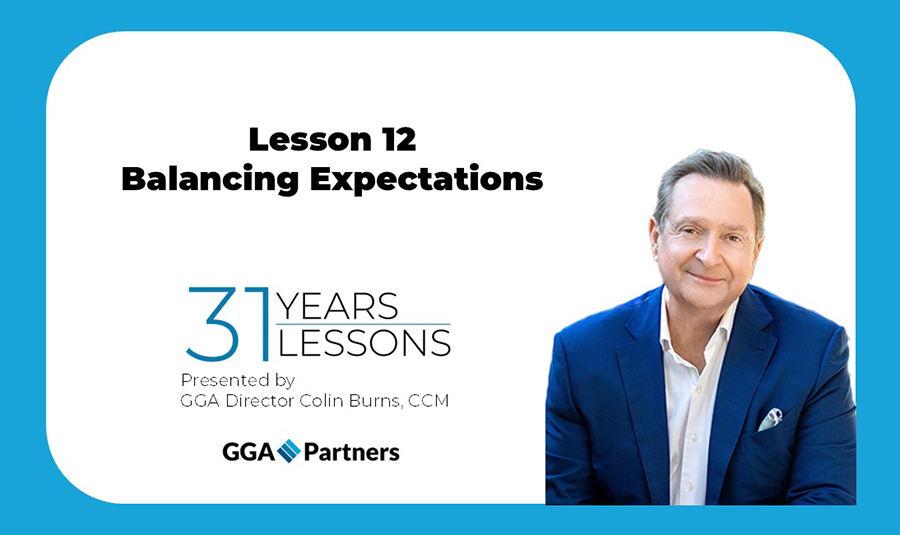
Lesson #12
of GGA Director Colin Burns’
31 years | 31 Lessons
We’re all been taught to exceed member expectations, but sometimes that simply isn’t possible.
Colin shares the importance of communications to balance expectations.

Lesson #12
of GGA Director Colin Burns’
31 years | 31 Lessons
We’re all been taught to exceed member expectations, but sometimes that simply isn’t possible.
Colin shares the importance of communications to balance expectations.
Peter Drucker famously advised, “Culture eats strategy for breakfast.”
And he was correct. In a private club “culture” is governance. Club leaders do well to place themselves and their clubs at the intersection of governance and strategy. Five keys for clubs that master blending governance and strategy are shown below:
1. Be intentional. Making your club’s governance better – more trusted…more transparent…more business-like – is one of the primary goals.
Sound and trustworthy governance follows business planning that is organized, deliberate, and time oriented. In day-today parlance it is a matter of telling people what you will do and doing it to the best of your ability. Sound strategic planning for a private club involves: (a) informing members as to what the club’s leaders will do, (b) providing timely updates to inform all members, (c) adjusting to changing or emerging circumstances, and (d) executing a thorough plan that has been shared with all members.
By definition, strategic planning is a process-driven method for identifying key goals and objectives and the methods that will be used to answer the question: what?
2. Build the business case for sound governance. Show how strategy delivers and keeps your club’s members engaged, happy, and supportive. Most club members want to know several simple things: (a) what the Club stands for – as described in its mission, vision, and core values; (b) the primary goals that their board will pursue to deliver on the club’s promises; and (c) accountability by the board to the general membership for the decisions that are made with their resources if time and treasure.
“We need to decide who we want to be when we grow up.” This over-simplified statement is often the one used by club members when describing club’s which lack clearly stated and understood purpose. Club leaders do well when they can clearly state the club’s purpose.
The business case for sound governance involves reliable financial performance on which most members place great importance and the assurance that “the club will continue to be what I want it to be.” Since clubs evolve in real time, club leaders must regularly update and revise the club’s purposes to ensure that the club remains relevant to most members.
3. Set a process map and timetable. Trustworthy, transparent governance requires stating one’s intentions and reporting regularly in a time-oriented manner. Stated simply, “plan your work and work your plan.”
Process maps are everyday corporate tools which provide structure, organization, time references, and accountability. The most useful process maps used in private club settings – such as a GANTT chart – show (a) what is to be done and (b) when it is to be completed. Nothing complicated here.
Timely updates which are redundant messaging using multiple media – such as email, hard copies, and social media links – help interested members to understand how the club is being effectively governed and lead.
4. State the strategic goals clearly and simply. Best practice goal setting relies upon four to six annual strategic goals. Select the goals that will most effectively move the club forward constructively and address the club’s primary needs.
Review the difference between strategy and tactics to ensure that your club’s goals are not tactical. The operating or business plan are the place for the tactical objectives. A key to dependable governance is the board members’ ability to remain focused on the big-picture strategic goals.
5. Measure and report the board’s performance on a strategic scorecard. Demonstrating to ordinary members of the club that they board understands that it is accountable to members is a cornerstone for sound governance.
Keep score on the four to six strategic goals and update the scorecard quarterly. In addition to simple email blasts, conduct quarterly meetings with members to update them regarding strategy…and don’t be dragged into the tactical weeds with concerns of the day.
The intersection of governance and strategy defines the future success of your club.
GGA Partner Henry DeLozier penned this article for Boardroom Briefs. It appeared in the August 3, 2024 edition.
Launched in 2020 to benchmark operational data and examine trends while exploring timely topics to address new challenges and take advantage of market opportunities, this year’s annual survey shows:
About GGA Partners
GGA Partners™ is an international consulting firm and leading advisor to many of the world’s most successful golf courses, private clubs, resorts, and residential communities. We work with owners, asset managers, club and community leaders, investors and real estate developers tackle challenges, achieve objectives, and maximize asset performance. Established in 1992 as the KPMG Golf Industry Practice, our global team of experienced professionals leverage in-depth business intelligence and proprietary global data to deliver impactful strategic solutions and lasting success. GGA Partners has offices in Toronto, Ontario, West Palm Beach, Florida, Phoenix, Arizona and Dublin, Ireland.
GGA Partners is proud to be a long-standing CMAA Business Partner.
For further information, contact:
Dr. Eric Brey, Ph.D.
Director
GGA Partners
t: 715.505.7716
e: eric.brey@ggapartners.com
For additional information the Club Management Association of America, visit: cmaa.org

Lesson #10
of GGA Director Colin Burns’
31 years | 31 Lessons
features sage advice about dynamic communications

Lesson #10
of GGA Director Colin Burns’
31 years | 31 Lessons
features the lessons Colin learned about
owning your mistakes

Lesson #9
of GGA Director Colin Burns’
31 years | 31 Lessons
features the lessons Colin learned about
interacting with members
Imagine how the architects who were commissioned to restore the Notre-Dame Cathedral to its original magnificence felt in 2021 when awarded the project and given an ambitious timeline for its completion. Or how a surgeon feels with Tiger Woods on his operating table.
Welcome to the emotion-charged worlds of Colonial Country Club CEO Frank Cordeiro, director of agronomy Rich McIntosh and renowned golf course architect Gil Hanse when the decision was made to fully renovate one of the most historic courses in America.
Their job was to bring Colonial back to the way it played in its early days — say, in 1941 when Craig Wood won the U.S. Open over the track that came to be known as Hogan’s Alley, so named for Ben Hogan’s five wins there.
They were tasked with reintroducing a ruggedness to the landscape — a more natural look and feel — and bringing the added influence of the Trinity River into play. While the patient was on the table, why not also revamp the course’s irrigation systems?
Oh, almost forgot: They would have less than a year’s time to complete the project before PGA Tour players struck their first shots at Colonial in the long-running Charles Schwab Challenge. Under more normal circumstances, such an undertaking would require 18 months.
Hanse, whose résumé includes restorations at Los Angeles Country Club, the Olympic Club, Oakland Hills and Baltusrol, had faced aggressive deadlines before in his celebrated career. But those challenges didn’t come packaged with Texas’s unpredictable weather. The renovation’s success hinged on the course’s recently planted turf making it through the winter without significant setbacks. On that score, they surely found no comfort in the state’s recent history of record-breaking ice and snowstorms.
Nor would there be any mulligans. The timeline allowed for no adjustments — the pros would be the first to play the course, even before any members.
Intimidating? Daunting? Risky for men with their estimable reputations?
As Hanse said — and many others no doubt believed — failure was not an option. “When you have a deadline like this, you really can’t fail. There’s so much riding on it.”
Those who took on the challenge — a group that also included Caveman Construction, LaBar Golf Renovations, Heritage Links, Michael Kuhn & Associates and Colonial’s own agronomy staff — followed in the bold footsteps of Colonial founder Marvin Leonard. Some eight decades ago, Leonard envisioned a golf course and club unlike others in the Lone Star State. He wanted bentgrass greens when others warned against it. He conceived of an invitational event for the world’s best players. He persuaded the USGA to bring its national championship to Colonial only five years after it opened.
The team swung into action almost as soon as the last putt dropped in the 2023 Charles Schwab Challenge. In all, they moved upwards of 30,000 cubic yards of dirt as part of a $25 million budget.
A supportive membership surely relieved some anxiety. “The project received well over 80 percent support at the time of the project approval vote,” Cordeiro says. “Throughout the project, the members were patient and supportive. No complaints, just encouragement, support and excitement.”
By now, we know the project was successful. Reviews were unabashedly positive in the days leading up to May’s tour stop and during the tournament.
“The project was executed without a single change order. Amazing on a project of this scope, complexity, and schedule. Not possible without great partners,” Cordiero marvels.
Even some of golf’s notoriously harsh critics were impressed.
“I imagine it’s tough for a course designer to bring a course back in time, but accommodating the modern game, making it maybe more playable for an average member 51 weeks of the year, but still a championship golf course making it as or more difficult for us,” Jordan Spieth said on the eve of this year’s Charles Schwab event. “I guess time will tell over the next four days, but it really seems like he’s somehow done that, and that’s really cool.”
GGA Partner Henry DeLozier penned this article for golfcourseindustry.com. It appeared in July 2024.
 Lesson #8
Lesson #8
of GGA Director Colin Burns’
31 years | 31 Lessons
features the lessons Colin learned about
Financial Stewardship
In a recent study of the 4,000-plus private clubs in North America, GGA Partners™ found that almost nine in 10 clubs are full and experiencing significant wait-list growth. Certainly, the pandemic introduced by the novel coronavirus has brought unprecedented growth to private clubs. The question now is…how will clubs retain all of these members?
Here are three factors club leaders should monitor:
UNDERSTAND MARKET EVOLUTION
During the past several decades, four factors most consistently influenced demand for club memberships:
The pandemic has blurred the historic lines as people have become less mobile and have found private clubs to be a safe haven for their families. Now, the market has evolved to maximize the influence of proximity; thus, proximity/location is of great significance. Current indications suggest that this reliance on clubs will endure as many professionals work remotely and have more time that was previously required for commuting to and from work.
Club leaders and operators must remain current regarding market conditions, requirements, and expectations.
MONITOR MEMBER SATISFACTION & ENGAGEMENT
Member satisfaction is the primary metric followed closely by engagement metrics. Knowing how engaged members are with the club is a simple measure of participation in special events, dining, new concepts, and programs. Survey members regularly using brief and to-the-point member satisfaction measures.
Alarm bells should sound when members are less engaged and enthusiastic about the club’s offerings.
WATCH FOR THE “CANARY IN THE COAL MINE”
Traditionally, a live canary was used to monitor air quality in the mine and would die if the air were not safe to breathe. The idiom suggests the importance of an early warning system for the club. Three dependable “canaries” for your club are:
Member Attrition – Most clubs have historic reference points for how many members are lost each year to mortality, relocation…life. In lean times, clubs struggled to sustain a balance between new members joining and those lost. Currently, more members want to join than wish to leave. Monitor the trendline as an early indicator.
New Member Leads Traffic – Current demand for new memberships is very strong. It will cool as society evolves past the pandemic. Club leaders should consider the flow of new inquiries – people who wish to join the club – as an early indication of market change. Each club should know its own successful conversion rate and understand that it must maintain leads in excess of attrition since some leads do not convert into full membership equivalents.
Consumer Confidence – Your club should make consumer confidence a part of each member survey using such simple questions as “are you confident for the club’s future” or net promoter metrics to track. The Conference Board is the source of the Consumer Confidence Index, which you can use as a broad indicator, and it does not replace the valuable guidance available from your own members.
Members are the lifeblood of private clubs. Recruiting and retaining them is the difference between success and failure.
GGA Partner Henry DeLozier penned this article for BoardRoom Briefs. It appeared in the June 22, 2024 edition.